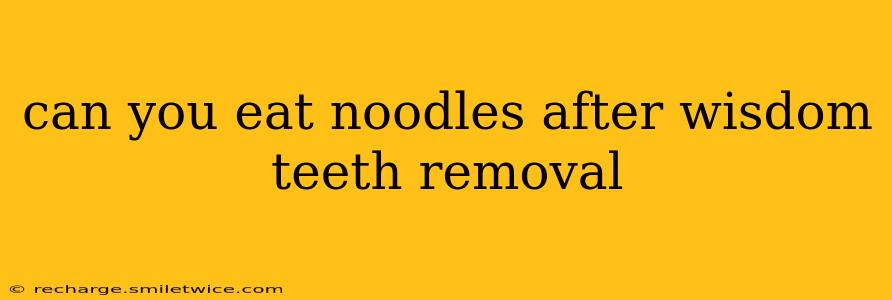Can You Eat Noodles After Wisdom Teeth Removal? A Guide to Post-Surgery Diet
Having your wisdom teeth removed is a significant oral surgery, and the recovery process requires careful attention to your diet. One of the most common questions patients have is: can I eat noodles after wisdom teeth removal? The answer, unfortunately, isn't a simple yes or no. It depends on several factors, including the type of noodles and your individual healing progress.
This guide will explore the intricacies of eating noodles post-wisdom tooth extraction, addressing common concerns and offering advice for a comfortable and healthy recovery.
What kind of noodles are okay to eat after wisdom teeth removal?
The key consideration here is texture. You want to avoid anything that requires significant chewing or could get lodged in the extraction sites. Soft noodles, such as well-cooked ramen noodles (without crunchy toppings), or very finely cut and thoroughly cooked spaghetti are generally safer options in the early stages of recovery, provided they are soft enough to be easily mashed with a fork. Avoid noodles that are firm or crunchy.
When can I start eating noodles after wisdom teeth removal?
Most oral surgeons recommend a liquid or pureed diet for the first 24-48 hours after wisdom teeth extraction. This allows the blood clots to form properly in the extraction sockets, crucial for preventing dry socket (a painful complication). After this initial period, you can gradually introduce softer foods, including very well-cooked noodles, but only if they are easy to consume without causing discomfort. Pay close attention to your body’s signals. If eating noodles causes pain, swelling, or bleeding, stop immediately and switch back to softer foods.
Are there any noodles I should absolutely avoid after wisdom teeth removal?
Yes, several types of noodles should be avoided:
- Noodles that require extensive chewing: Avoid anything that needs significant jaw movement, such as firm pasta, uncooked noodles, or noodles with tough or chewy additions.
- Noodles with sharp or crunchy toppings: Stay away from noodles with hard bits like croutons, crispy vegetables, or excessively crunchy seasoning. These could irritate the extraction sites or dislodge blood clots.
- Noodles in overly hot broth: Extremely hot liquids can increase bleeding and discomfort.
What other foods can I eat after wisdom teeth removal?
Beyond noodles, focus on soft, easily mashed or pureed foods during the initial healing phase. Examples include:
- Smoothies
- Applesauce
- Yogurt
- Mashed potatoes
- Scrambled eggs
- Pudding
- Soup (cooled to a lukewarm temperature)
How long will I need to stick to a soft food diet after wisdom teeth removal?
The duration of your soft food diet depends on individual healing and the complexity of your surgery. Most people can transition to a more normal diet within a week or two, but it's essential to listen to your body. If you experience any discomfort, continue with a soft food diet until the healing process is further advanced. Always follow your oral surgeon’s instructions meticulously.
What should I do if I experience pain or complications after eating noodles?
If you experience any increased pain, swelling, bleeding, or other complications after eating noodles or any other food, contact your oral surgeon or dentist immediately.
Disclaimer: This information is intended for general knowledge and informational purposes only, and does not constitute medical advice. It is essential to consult with your dentist or oral surgeon for personalized advice regarding your post-operative diet after wisdom teeth removal. They can provide specific recommendations based on your individual case and healing progress. Always follow their instructions carefully to ensure a safe and successful recovery.
